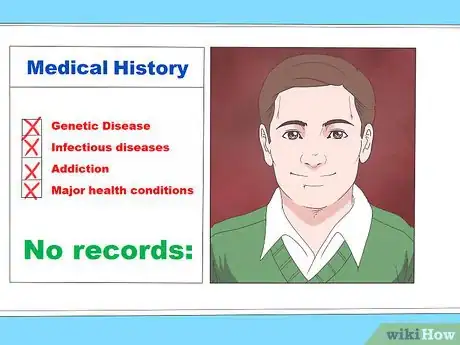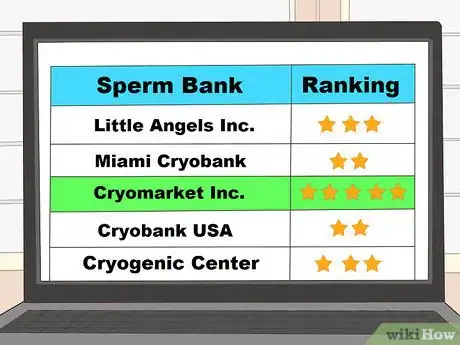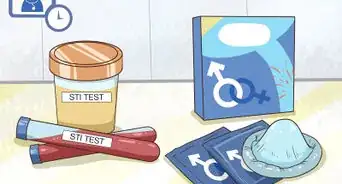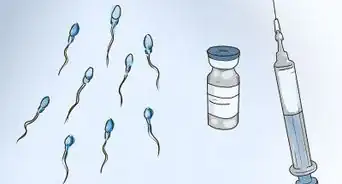This article was co-authored by wikiHow Staff. Our trained team of editors and researchers validate articles for accuracy and comprehensiveness. wikiHow's Content Management Team carefully monitors the work from our editorial staff to ensure that each article is backed by trusted research and meets our high quality standards.
There are 14 references cited in this article, which can be found at the bottom of the page.
This article has been viewed 24,371 times.
Learn more...
Getting pregnant can be an exciting and difficult time in your life, especially if you’re looking for a sperm donor to help you conceive. The many factors to consider, banks and donors to look at, and legal and medical steps to take can make this process feel overwhelming. By staying patient and focusing on what you want in a donor, you can ensure that you make a great choice and start the process off on a positive note.
Steps
Deciding on Your Priorities
-
1Choose a donor you like physically. Physical appearance is a major factor many people think of when choosing a donor. You might want a donor with a particular height and weight, hair and eye color, ethnicity, and more, and it’s totally fine to look for these characteristics when searching. Think about what your ideal donor might look like and start jotting down those traits.[1]
- Some people want a donor that looks similar to you or your partner, so take this into consideration as well.
- If you’re using a sperm bank, you won’t be able to see what the donor looks like now, but you can read verbal descriptions and often see their baby photos or see their celebrity lookalikes.
-
2Look for someone with talents and a personality you like. For many, a donor’s personality and talents are just as important as their physical appearance. Think about whether you want a donor that’s athletic or musical, has a great sense of humor or a lot of compassion. Look for these qualities in donor question-and-answer sections, interviews with staff, and their stated interests.[2]
- Many of these traits haven’t been proven to be passed down genetically, but many people feel more comfortable choosing a donor with a personality they like.
Advertisement -
3Find a donor with an education and background you approve of. You may want to choose a donor with a higher IQ, one that graduated from college, or one that has an interesting or intellectually stimulating career. Again, there’s no guarantee that your child will inherit these traits, but it can still feel better to choose someone who’s smart and successful as your donor.[3]
-
4Use a donor with a healthy medical background. Other traits aside, it’s essential that you choose a donor with a good medical history, both personally and within their family. Look for someone with no immediate family history of genetic or infectious diseases, addiction, or major health conditions to ensure your baby is as healthy as possible.[4]
- If you use a sperm bank, the donor’s medical history will almost always be checked out beforehand.
-
5Remember that there’s no guarantee that your child will have your donor’s traits. With both physical and personality or intellectual traits, you never know what your child will inherit from the donor. However, many people tend to go for the traits they like best with the mentality that they’re at least giving their child a good shot of inheriting them.[5]
-
6Rank your ideal donor traits in order of importance. Once you’ve figured out your ideal donor characteristics, arrange them into a list. Rank the traits from most to least important and decide on your top 3 “must-have” traits. Ranking the characteristics helps you see which are your priorities, just in case you have to be more flexible.
- Keep your expectations realistic. It’s unlikely that you’ll find a donor that fulfills all your ideal traits, but you can definitely find one that hits the most important ones.
-
7Don’t worry if your priorities change. When you start your search, you could realize that the traits you think are the most important might not actually be your priorities. This is normal. Don’t be afraid to revise your list as you go and be open to new priorities.[6]
- For example, maybe you went in prioritizing education and realize that you’re more drawn to a sense of humor or generous personality. Whatever it is, feel free to refocus your search on new criteria when you need to.
Using a Sperm Bank
-
1Choose from a sperm bank to look at pre-screened donors. One of the advantages of choosing a donor from a sperm bank is that your options are thoroughly vetted beforehand for health issues like family health backgrounds, addictions, or infectious and genetic diseases. They’ll also provide extra information, like physical characteristics and personality descriptions, job, education, and more.
- Choosing through a sperm bank also ensures that the bank can take care of the legal and scientific steps of setting up the donation, freezing the sperm, and more.
-
2Choose a sperm bank that fits with your policy preferences. When you’re researching sperm bank options, find out what kind of donor information they release, if they maintain donor information over time, and if they provide support for children, parents, and donors after birth. See what the bank’s offspring limit is and how they track the outcome of donations.[7]
- Look up reviews online for objective opinions on a sperm bank.
- All reliable sperm banks should test donors for sexually transmitted diseases and genetic illnesses; give donors annual physicals; and provide personal and family medical history for each donor.
- Call the sperm bank directly if you have any questions.
-
3Make an account to use the bank’s full services. Most sperm banks allow you to look at donors before making an account, seeing things like their occupation and physical characteristics. You can typically see even more information with an account, including voice and conversation samples, childhood photos, staff reviews, and celebrity lookalikes.[8]
- Look online or call the bank to see how to set up an online account. It typically won’t be connected to the account you’ll need to purchase vials from the sperm bank; think of this as your browsing account.
-
4Browse through your sperm donor options. With your ranked list of traits in hand, use the filter options on the site to start narrowing down your list of potential donors. Look at each profile closely to see what criteria the donor meets, bookmarking donors that you think are promising.
- Focus on meeting the “must-haves” from your list of characteristics. You probably won’t find a donor that perfectly matches all of your criteria, but you can definitely find one that meets your top points.
-
5Ask trusted friends or family members if you need an outside opinion. The more profiles you look at, the more difficult your search can get. If you’re feeling overwhelmed by your options or aren’t sure what you want anymore, don’t be afraid to call a close friend or family member for advice.[9]
- Say something like, “I’m hitting a wall in my donor search. I have a few guys who are great, but no one stands out like I thought they would. You know me better than anyone; can you come over and take a look?”
- You can ask them to narrow your list of donors to their top 5 or 10, review your search criteria, or anything else you feel comfortable getting help with.
-
6Choose a donor that meets your criteria and feels right. Once you’ve narrowed down your list to 2-3 options, review your criteria carefully one last time. You want a donor that matches your priorities, but you should also use your instincts. Which donor reminds you of the friends and family that you love? Which one feels like the right choice?
- There’s no way to know how much the sperm donor will affect the identity of your child, but you do know that by raising and loving your child, you can help them become a great person, no matter what their genetic makeup.
- Once you’ve chosen, go onto your sperm bank’s website or call them to purchase the sperm.
Working with a Donor You Know
-
1Choose someone you know if you want them to have a relationship with your child. Some people decide to go with a known donor if they feel close to that person, or want them to be part of their child’s life. Choosing a known donor can be exciting, but it comes with its own challenges, such as a higher cost and possible legal complications.[10]
- This process can be costly, approaching up to $5,000, since you’ll need to pay to have the donor’s sperm frozen and tested for infectious diseases.
-
2Look up donor insemination laws in your state. Laws on parental rights and sperm donors vary by state, so look up yours before you make the decision to ask a known donor. Typically, a child conceived through artificial insemination with a donor that’s not the person's partner will not be considered the donor’s child; the donor won’t have parental rights. [11]
- You and the donor should sign a legal agreement specifying the terms of the donation, even if it aligns with state law.
- You should also have the insemination done at a medical facility to ensure that you have other witnesses, such as a doctor, in case of any issues of parental rights.
-
3Think of someone you know who would hit most of your major criteria. When you’re ready to start choosing your donor, make a ranked list of the things you want in a donor, including physical, intellectual, and emotional characteristics. Make a list of people you know who could be potential sperm donors, then start narrowing them down based on who hits your top traits and feels the most right.
- If you want, ask for an outside opinion from a close friend or family member to help you make your choice.
- Think about things like whether the potential donor is loving, smart, physically healthy, and a good person.
-
4Ask the person if they're willing to be your sperm donor. When you’ve made your choice, ask the potential donor to talk to you one-on-one. Tell them that you want to have a child via artificial insemination, and that you’d really like them to be your sperm donor. Give them a few reasons why, then start laying down your expectations for their role in the child’s life and see if they're OK with them.[12]
- For example, you start off with something like, “You know I’ve been wanting to have a kid for a while now, right? Well, I’ve decided to do it by artificial insemination, and I wanted to know if you’d be the sperm donor.”
- Follow up by saying, “You’re kind, smart, and handsome, which are all things I’d want in my child. But I know this is a hard ask, because I really wouldn’t want you to act like a father or anything more than a family friend.”
-
5Lay out what you want their rights to be. A tricky part of choosing a donor that you know is working out your different priorities as far as how present they'll be in your child’s life. They might want to be part of the child’s life, for example, while you’d rather he stay separate. This is a tough thing to talk about, but essential to discuss and resolve before you get further in the process.
- Bring it up by saying something like, “But before we go any further, I wanted to talk about what your rights would be.”
- Be compassionate and gentle when they talk about his preferences. Listen to and consider what he has to say rather than rejecting it right away.
- Discuss your viewpoints and see if you can resolve your disagreement. If not, they may not be the right donor for you.
-
6Ask them about their medical and family history. Even if they agree to the idea of being your donor, you still need to make sure they're healthy enough. Ask for a documented medical history for both them and their family, and about any smoking, drinking, or drug use habits. You should also ask that he gets tested for sexually transmitted diseases and take a fertility test.[13]
- These questions might seem awkward, but they’re crucial to ensure the health of your child.
- Say something like, “I need to know a lot about your medical and health background before I can make this choice for sure. Can you get me copies of your and your family’s full medical histories?” Thank them for their understanding and openness.
-
7Talk to an attorney to make a contract that will satisfy you and the donor. When you’ve verified that your donor is healthy, it’s time to make it official. Contact a family law attorney and tell them that you’re planning to have a child with sperm from a known donor, and that you want to draw up a sperm donor contract to make sure that your and your child’s rights are officially documented and protected.[14]
- The law can be tricky in this area, so don’t be afraid to ask the lawyer any questions you might have about sperm donors and parental rights.
- Explain to the donor that you’re doing this as a legal and official way to document your agreement. Be upfront about all your expectations so that they don’t get any surprises when you put together the contract.
-
8Choose a sperm bank to freeze and test their sperm. Look for a sperm bank that offers services for known donors, which may also be called designated or directed donors. Most banks require screening and testing of known donors that’s just as rigorous as with anonymous donors, particularly for health issues.[15]
- The donor will typically need to fill out several health forms, go in for a physical consultation and testing for diseases, and have a semen and eligibility analysis done.
- When the donor passes these examinations, they’ll donate their samples and their sperm will typically be “quarantined” for 6 months to officially clear them for use.
References
- ↑ https://www.singlemothersbychoice.org/2017/01/14/choosing-a-sperm-donor-decisions-decisions-decisions/
- ↑ https://www.singlemothersbychoice.org/2017/01/14/choosing-a-sperm-donor-decisions-decisions-decisions/
- ↑ https://medlineplus.gov/genetics/understanding/traits/intelligence/
- ↑ https://www.mayoclinic.org/tests-procedures/sperm-donation/about/pac-20395032
- ↑ https://www.nu.edu/resources/ask-an-expert-is-human-behavior-genetic-or-learned/
- ↑ https://cupofjo.com/2017/11/choosing-a-sperm-donor/
- ↑ http://www.choicemoms.org/trying/choosing_a_sperm_bank/
- ↑ https://cupofjo.com/2017/11/choosing-a-sperm-donor/
- ↑ https://www.kveller.com/single-mother-by-choice-how-to-choose-a-sperm-donor/
- ↑ https://www.familyequality.org/resources/choosing-between-a-known-and-unknown-sperm-donor/
- ↑ https://www.ncbi.nlm.nih.gov/pmc/articles/PMC6170122/
- ↑ https://www.theatlantic.com/family/archive/2018/07/sperm-donations-emotional-consequences/564587/
- ↑ https://www.coparents.co.uk/blog/22-questions-to-ask-your-sperm-donor/?__cf_chl_captcha_tk__=pmd_a6186805c35811a41f6ee299126af4b7937a54ab-1628517609-0-gqNtZGzNAyKjcnBszQii
- ↑ https://www.crossroadslaw.ca/blog/sperm-donation-questions-answered-by-a-fertility-lawyer/
- ↑ http://www.gayivf.com/lgbtq-fertility-education-center/choosing-donor-sperm-known-or-unknown.cfm
About This Article
To choose the right sperm donor, first rank a list of ideal donor traits, from physical characteristics to intellect and personality. If you want an anonymous donor, find a sperm bank with policies that you approve of and look for a donor that hits your must-have criteria. If you prefer the donor to be someone you know, ask them in private and explain what you’d want their role to be. Vet their medical history and draw up a contract with a family law attorney to delineate your rights. For tips on how to find a good sperm bank, read on!













































































Medical Disclaimer
The content of this article is not intended to be a substitute for professional medical advice, examination, diagnosis, or treatment. You should always contact your doctor or other qualified healthcare professional before starting, changing, or stopping any kind of health treatment.
Read More...